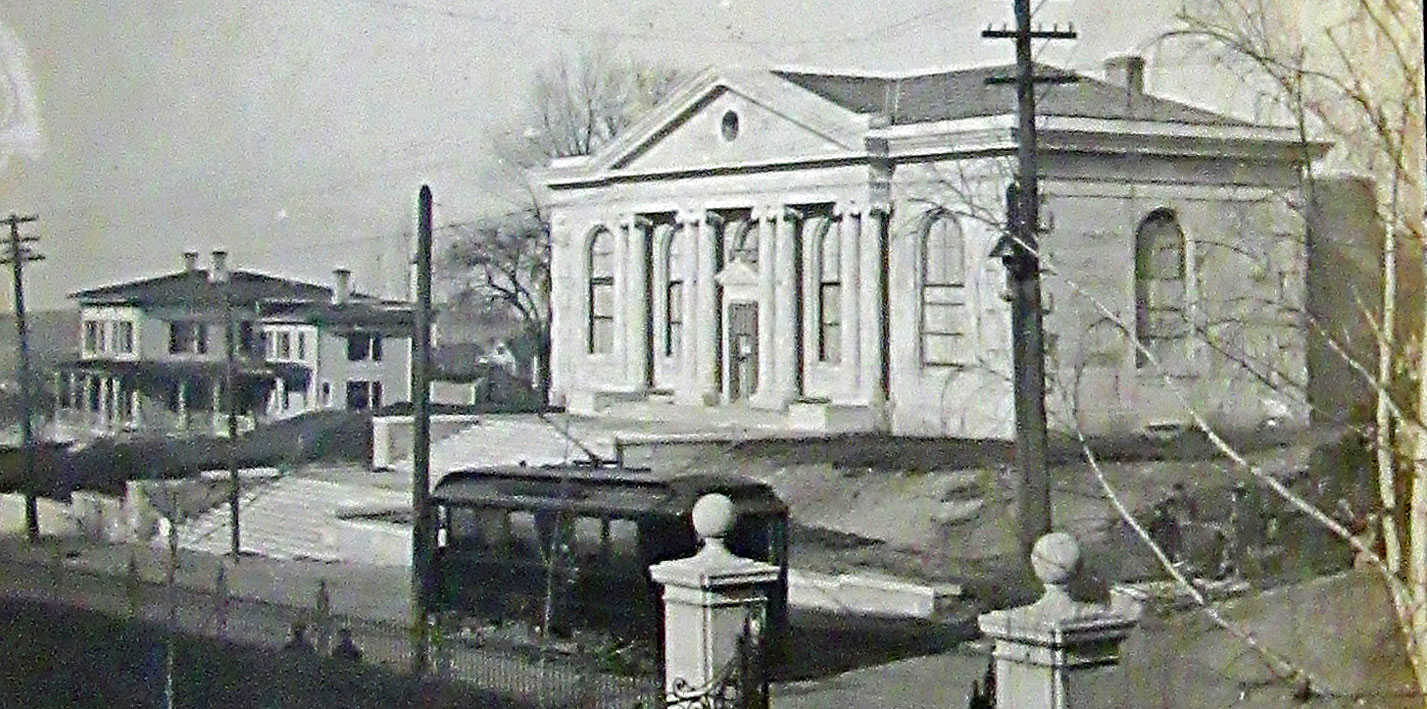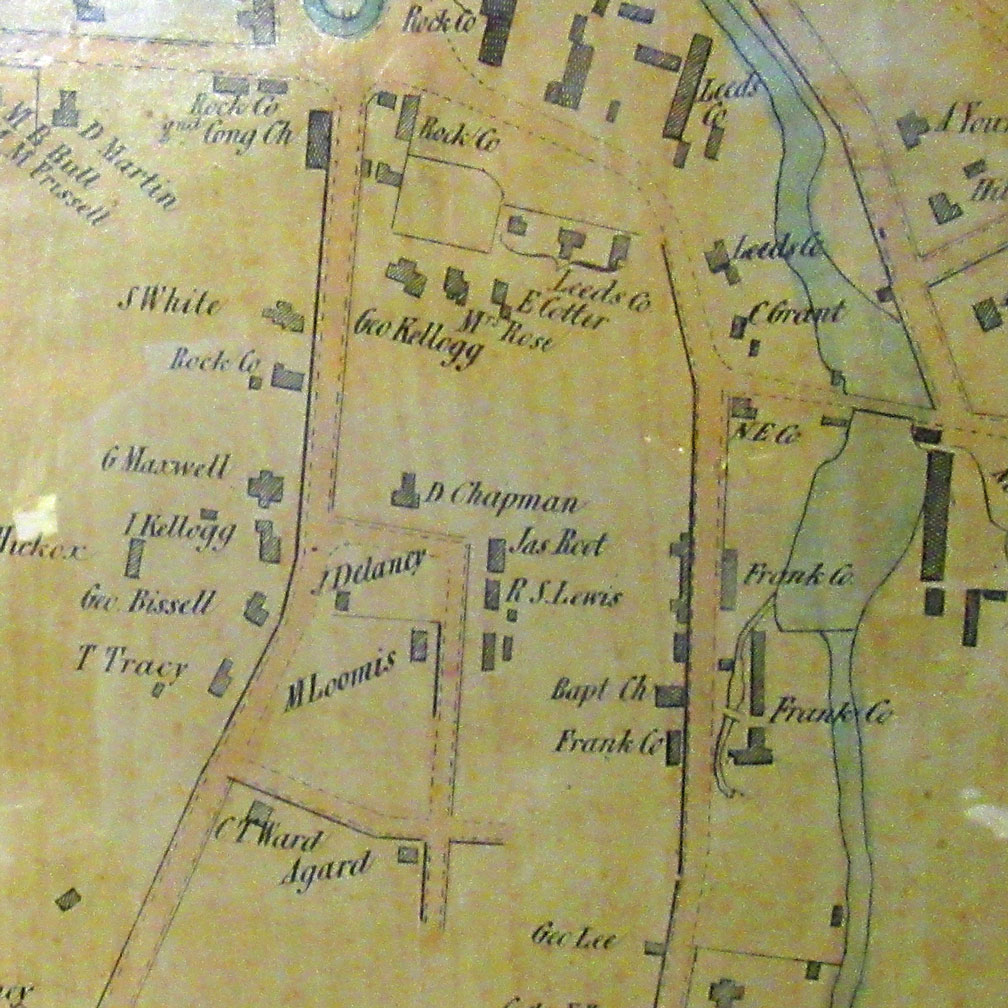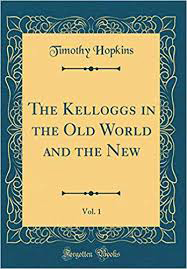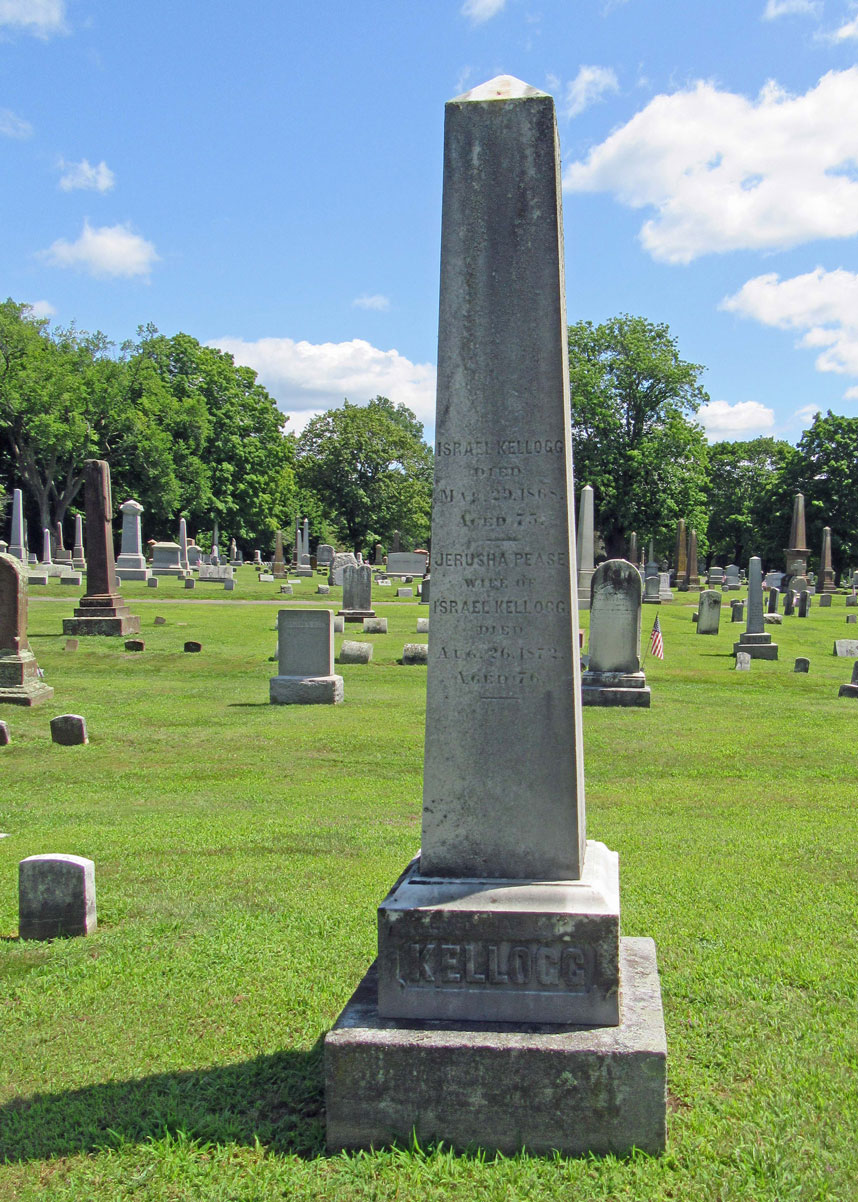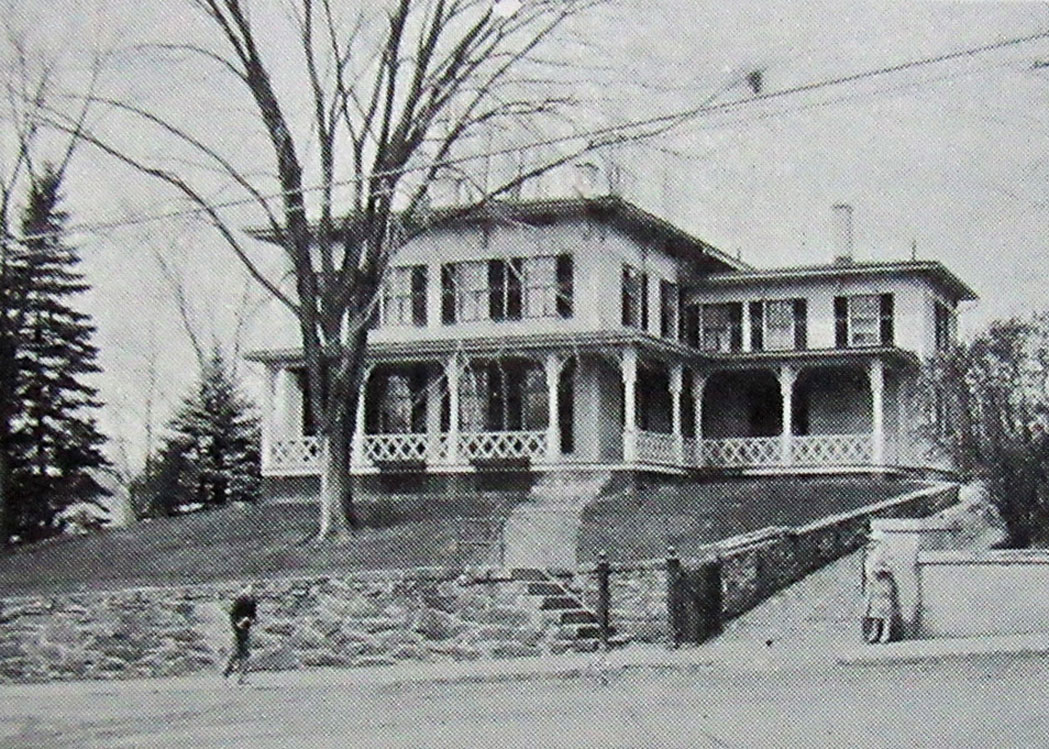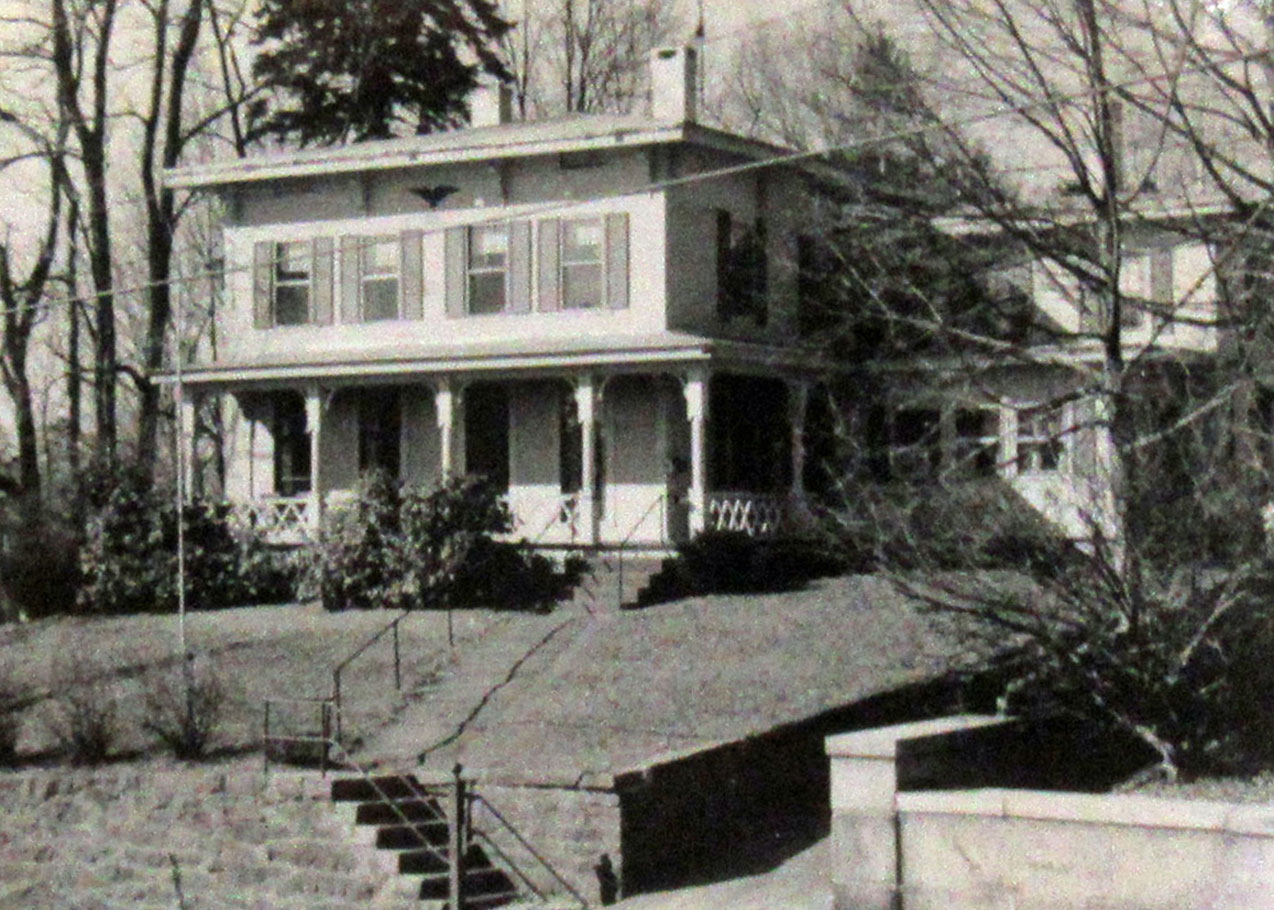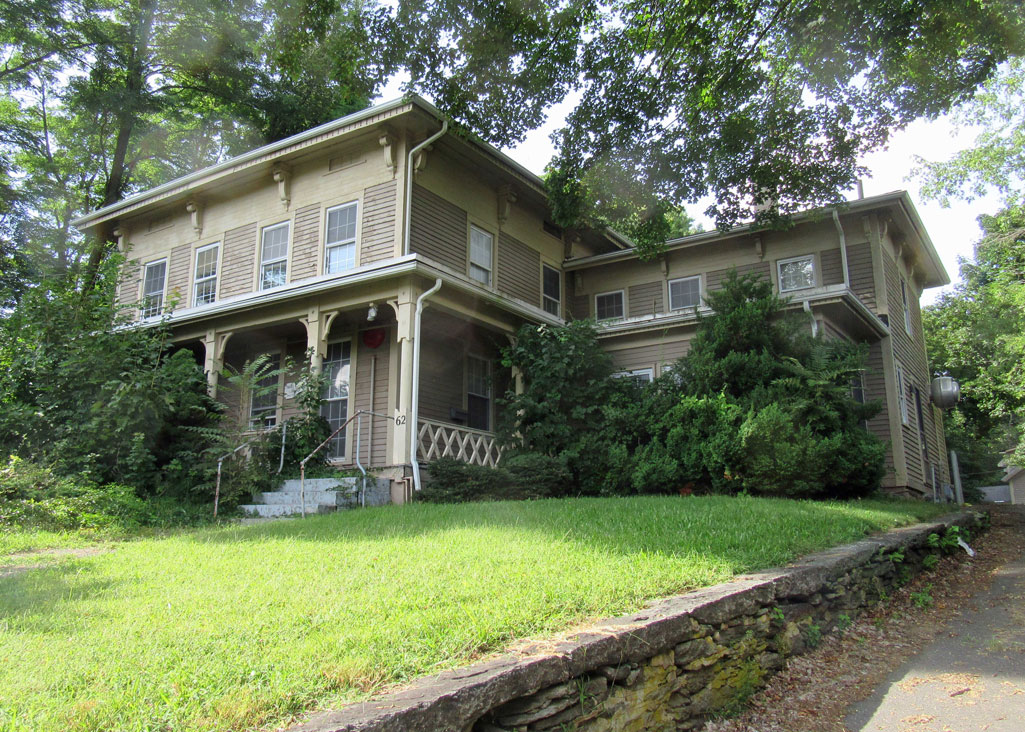 |
| Home | Geography | History | Biology | Recreation | News | Resources |
| Timeline | Narrative | Events | Places | People |
Rockville's Israel Kellogg House
The town recently announced it's plans to purchase the property next to the Rockville Public Library at 62 Union Street for additional parking. The property includes a long vacant house known as the Israel Kellogg House built about 1850. Who was Israel Kellogg?
Rev. Ebenezer Kellogg was our first minister. His descendants helped build the mills of Rockville, and also created the mill town that would become Talcottville. From their efforts they became very wealthy. Rev. Kellogg's descendants have been well researched and don't include anyone named Israel nor does the name appear in Vernon-Rockville histories. Israel Kellogg's house is shown on the 1853 map of Rockville on Union Street opposite the residence of George Kellogg, one of the founders of the Rock Mill, but they don't seem to have been related. A cemetery search finds a monument in Grove Hill Cemetery for Israel Kellogg and his family. The inscription says he died in 1868 at age 75. The size of the monument and plot indicate he was a man of some means. But there are no other Kelloggs buried nearby suggesting he was not part of the well established local Kelloggs. Other Kelloggs of that era were buried at Elmwood Cemetery in Vernon Center or in the private Maxwell section of Grove Hill. Was he in some way related to our local Kelloggs and if so how? The Kellogg Family Connection
Fortunately there is an excellent Kellogg genealogy that traces many of the branches of the family from the earliest immigrants to America. Indeed it's necessary to go back to the first immigrant Martin Kellogg (1595-1671) to find the common ancestor. The brothers Daniel and Joseph Kellogg, sons of Martin, were born in England coming to the Boston area with their father around 1630. Rev. Ebenezer Kellogg descended from Daniel and Israel Kellogg from Joseph. They took different paths to reach Vernon. Israel's ancestor Joseph (1626-1707) came first to the Farmington, CT area from Boston. He soon moved to Hadley, MA in the Pioneer Valley as did many early Connecticut River settlers. The family returned to Connecticut when Joseph's son Jonathan (1679-1771) moved to Colchester to build a sawmill. One of Jonathan's sons, Israel (1722-1784), was the first of the family with that name - perhaps from his mother's side. Of interest in his will Jonathan left Israel a 10 year old Negro boy named Esau. Israel's son Amos (1758-1814) moved to Somers where he purchased a Shaker farm. In the front rooms the Shakers held their meetings and the floor was worn smooth by their dancing. He owned a great deal of land and a cider mill. It was here that our Israel was born in 1792. Israel KelloggSo Rockville's Israel Kellogg (1792-1867) was born in Somers and named for his paternal grandfather. He was just 22 when his father died in 1814 and inherited 20 acres of his land. He married Jerusha Pease in 1818 at age 26 and they had 8 children. Before coming to Rockville he farmed in West Springfield where his children were born. At the time of the 1840 census he still lived and farmed in West Springfield with 9 people in his household including 6 under 20. He was 47 at the time.
The mid 1840's was a boom time in Rockville. People were coming to work in the mills and new housing and stores were being built. Israel, now in his 50's, saw an opportunity to leave the farm and lead a less physically demanding life. He built a large house on Union Street to be used as a boarding house for mill workers. There were additional buildings on the property that may have been used for housing too. We know this because the 1850 census lists, in addition to the 8 Kelloggs, another 17 people ranging in age from 10 to 35, each with a unique surname and most working in the mills. He was 57 at the time of the census. By 1860 he was 67 and only his wife and two unmarried daughters live at home, although there are still 5 boarders ages 18 to 23. Two of the boarders are women, both teachers. The men were all employed as clerks. Israel died in 1868. A short notice in the March 31 Hartford Courant indicates he died suddenly of pneumonia after a brief illness and that two of his sons - Julius and E. P. still lived in Rockville. A second Hartford Courant article on September 8 reports on an Israel Kellogg family reunion at the family home. The family intended to celebrate Israel and Jerusha's Golden Wedding anniversary that year. Six of the sons and one daughter came to the celebration with two sons coming from Iowa and another from California. There were also eight grandchildren present. Israel's will was probated in 1872 and besides his Rockville house he owned 14 acres in Ellington. He also owned a horse, wagon and sleigh. Israel was a fairly wealthy man as his property was valued at over $11,000, considerable money for the time. Israel is buried in Grove Hill Cemetery with his wife, three of his unmarried children and a daughter-in-law. One by one his sons had left Rockville - some for Hartford and others far West. After Israel's DeathIn 1982 the Israel Kellogg House was included in the Historic Resources Inventory for the CT Historical Commission compiled and written by Ardis Abbott and the Vernon Historical Society. The house is described as of the Italianate style and built about 1850. After Israel's death the family remained in the house for a time as the 1869 map of Rockville shows Mrs. I. Kellogg owning the house. In 1881 the house and property were sold to George Maxwell (Vernon 24-149). He in turn sold it to the Second Ecclesiastical Society and it would serve as the first parsonage of the Union Congregational Church until about 1945. Maxwell owned the property on both sides of Union Avenue and his family in 1904 gave money to build the Maxwell Memorial Library next to Israel's old house, that became the Rockville Public Library. In 1940, Rev. George Brookes lived in the house when it was the parsonage for Union Congregational Church. Brookes was the church's pastor from 1925-1945 and is best known for writing the 1955 book "Cascades and Courage," a history of Vernon and Rockville. From 1946-1949 the building was the Green Haven Rest Home and from 1950 to the 1970s it was the Fair Haven Rest Home. In 1978 it was called the Clarence House which folded in the early 1980s. After that it was Verville, a residence for people with mental health issues. Its last use was as a home for troubled teens. Since 2004 the building has been empty. What's Next For Israel Kellogg's House?The following three photos show how little the house has changed over the years. The major change is landscaping. Originally in 1850 the house sat open and prominent at the top of the hill overlooking the valley to the West. At that time there were likely few trees to limit the view by locals of the house that Israel would have taken pride in building.
The town plans to tear down two small buildings behind the house for library parking. They will assess the condition, value and potential use of the house. Hopefully, this early gem can be saved and used - perhaps partially as a museum operated in cooperation between the Vernon Historical Society and Rockville Public Library. Sources1853 E. M. Woodford Vernon Map published by Richard Clark. This is the first detail map of Vernon and includes houses, businesses and owners. 1869 O.W. Gray Atlas of Windham & Tolland Counties. Colored maps of each town including Vernon and Rockville. Includes houses, businesses and names. 1903 "The Kelloggs In The Old World And The New, Vol. I" by Timothy Hopkins, 1903. Available online. 1963 Union Congregational Church of Christ's "75th Anniversary Celebration - 1888-1963" booklet. 1982 "Historic Resources Inventory - Clarence/Israel Kellogg House, 62 Union Street, Vernon/Rockville" by the Vernon Historical Society, compiled by A. Ardis Abboott - March 1982. 2019 Journal Inquirer article, August 8, 2019, page 1. "Town looks to expand parking at library." Updated August 2019 | ||
Home | Activities | News | References | Search | Site Map | Contact Us © Copyright The Tankerhoosen. All rights reserved. |
